Students study themes from classical literature, modern literature, Japanese language, and Japanese language education in order to develop literary sensibilities and insight.
They are also exposed to traditional culture such as Hyakunin Isshu (famous anthology of Japanese waka poems), kabuki theater, noh/kyogen theater, and more.
Department of Japanese Language and Literature
Three Key Learning Components
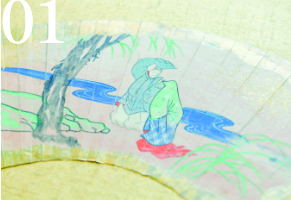
Conduct research on various areas of Japanese literature according to your interests
Conduct research on various areas of Japanese literature according to your interests
The department’s researchers study literature from a wide range of periods, from ancient texts to modern and contemporary works. From timeless classics to popular contemporary authors, each student can study their favorite areas according to their own individual interests. Students can study Japanese language and literature from a variety of perspectives—for instance, deepening their interest in elements of Japanese culture such as theater, rakugo (traditional Japanese storytelling), and ukiyoe (Japanese woodblock prints), and comparing film adaptations to their original works.
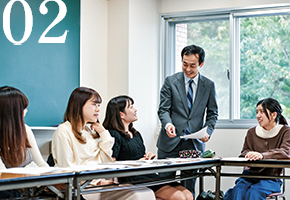
Learn and deepen your understanding of how the Japanese language works and has changed
Students are able to reevaluate the Japanese they use casually in their everyday lives, as an object of research, and analyze it objectively. They will discuss various aspects of the Japanese language, including its characters, grammar, and vocabulary, uncovering their mechanisms and how they have changed over time, and also consider expressions that are more familiar to us today, such as teen slang and honorific speech.
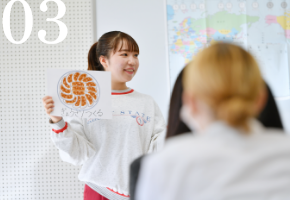
Program where you can learn how to teach Japanese from the fundamentals
The number of people who have been interested in Japan and Japanese culture—in a wide range of literary research, Japanese language research and analysis, and Japanese education and international exchange—has been growing in recent years. The Department of Japanese Language and Literature thus offers a “Registered Japanese Language Teacher Training Program.” In this program, students can learn how to teach Japanese, and take courses where they learn alongside international students. Students may also choose from domestic and international assignments for their practical training, which gives them the opportunity to experience other cultures through the Japanese language.
Department of French Language and Literature
Students gain a solid understanding of French, and are able to study a wide range of areas, including literature, philosophy, history, art, film, communication, and subcultures, through the three courses offered.
Three Key Learning Components

Three Key Learning Components Small-group education tailored to each student’s proficiency level
French courses are taught in small groups of no more than 15 students per class, geared towards complete beginners, intermediate learners, and advanced learners respectively. The department is home not only to Japanese faculty, but also native French faculty and French TAs, who are able to provide detailed guidance tailored to each student’s level of proficiency. By the end of their second years, students will have taken 315 hours of classes, and acquired solid French skills.

Develop academic skills and the ability to communicate logically through seminars
Students begin taking seminar-style classes in their first year to learn the basics of university study (academic skills), including how to conduct surveys, engage in research, and make presentations. Students will also be exposed to the richness of the French culture and lifestyle, by learning about its geography and delving into the country’s history. Through frequent presentations, they will also learn how to convey their own research to others in an easy-to-understand manner.
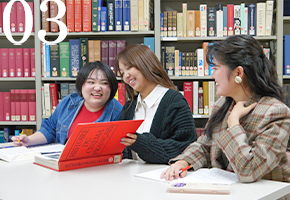
Delve deeper into the topics you are interested in
In addition to being able to choose from three courses related to French language and culture, the program also offers a specialized research seminar designed to deepen one’s understanding of their research topic. This combination allows students to delve deep into their areas of interest, whether it be literature, art, fashion, subculture, or food culture.
Department of English Language and Literature
Three Key Learning Components

Develop high-level English communication abilities
Students learn English in classes divided by level. The program utilizes specialized teaching materials to improve English input and output, and develop English language skills in a comprehensive and practical manner through classes that integrate all four core skills (listening, reading, speaking, and writing).
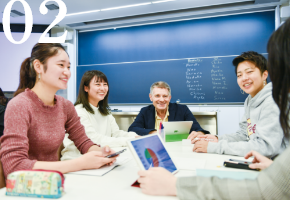
Fosters global intelligence through two lines of study
Students deepen their learning through two lines of study: culture and education. In the culture curriculum, students study the literature and history of the English-speaking world, particularly the U.K. and the U.S., and learn about the globalized world, including Japan. In the education curriculum, students not only study the English language from various angles, but also learn with an eye toward teacher training.
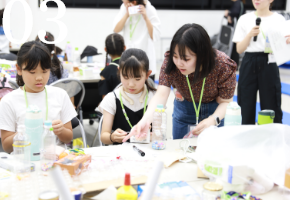
Broaden career choices through practical programs
Students can also choose to engage in practical programs that broaden their career choices. The department supports the career development of each individual student through programs that provide real-world experience and cultivate international employability, programs to study hospitality common throughout the world, and programs for learning how to teach English to children.
